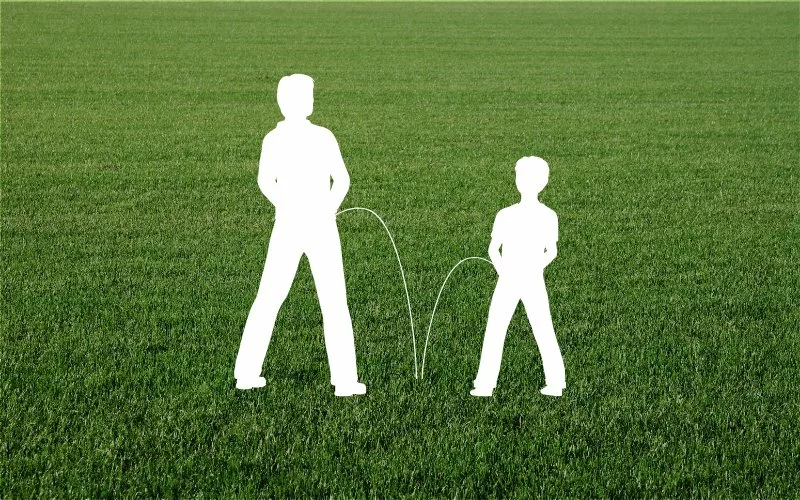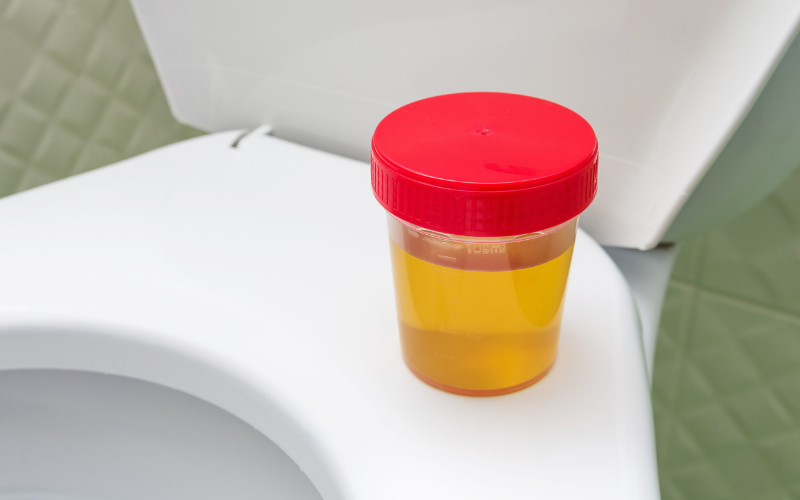Human urine can be a great source of plant nutrients. However, some experts say that human urine can be too strong for some plants. Does human urine kill grass by providing too many nutrients? Or is grass better suited to making the most of the nutrient content in human urine? You can find the answers to both of these questions and more below.

Does Human Urine Kill Grass?
Yes, human urine can kill grass. How well it does this will depend on the current pH of the soil, the concentration of the urine, the content of the urine, and the frequency at which human urine is applied to the soil.
For example, a single application of urine from a well-hydrated and healthy individual is unlikely to kill your lawn right away, but as little as three applications are enough to “burn” your lawn and severely damage it. This could eventually lead to the death of the grass or even the inability to grow grass in that patch of soil until it is repaired.
What Does Human Urine Do to Your Lawn?
Human urine can do several things to a lawn, depending on what it is made up of. Unlike commercial fertilizers or compost, the content of human urine will depend on where, when, and from who it was collected. While most urine samples have a similar makeup, certain conditions can make samples much less compatible with a healthy lawn. Dehydration, sodium intake, and prescription drug use are three things that can alter the balance of human urine and make it a poor choice for a lawn treatment or fertilizer.
Typical, healthy human urine with a low sodium content and a high water content, could be applied to grass directly, but dilution is always recommended first to prevent a buildup of substances in the soil. These substances, nutrients and otherwise, can quickly “burn” plants and lead to an undesirable appearance or a dead lawn.
This diluted urine can be used to provide all of the nitrogen, phosphorous, and potassium your lawn needs as well as provide a very slight pH boost, something many types of grass used in lawns will appreciate. Human urine is also a good source of uric acid. This stuff can eliminate fungal diseases, mold, and mildew on contact. It also causes dead plants to decompose faster.
When diluted, uric acid should be more of a help than a possible drawback. However, uric acid in its undiluted state could be used as a way to kill undesirable weeds and prevent your lawn from creeping into mulched beds or between paving stones.
Can Human Urine Kill Grass and Weeds?
Yes, human urine can kill grass and weeds for many reasons. However, all of these potentially deadly elements are found only in undiluted human urine. Once diluted properly, human urine is more of a fertilizer than a potential ally in the fight against lawn and garden weeds.
Undiluted urine can help clean up weeds in three ways. First, it contains uric acid that can burn and attempt to break down plants on contact. Uric acid is most prevalent in urine collected first thing in the morning or after a period of dehydration.
Next, undiluted human urine is so full of nitrogen that it can be too much of a good thing for most plants to handle. They take in too many nutrients and burn themselves out in the process. If they are already a little damaged from the uric acid, this could end up with them taking themselves out.
Further, as undiluted urine is continually added to the soil it can create a patch of soil where nothing wants to grow until the nutrient buildup has been diluted. This can make it an ideal substance for adding to a compost pile to create a nutrient-dense but weed-free batch of compost.
Related Article: Read More About What Kills Grass

How to Clean Up Human Urine on Grass
The best thing to do if you end up with a patch of human urine on your lawn is to dilute it. No matter what type of urine or its base contents, diluting it as quickly as possible should save that patch of lawn. No other steps need to be taken right away. However, if the person that left the urine was unhealthy or there was a copious amount of urine, you may end up with a slight pH imbalance. Test and correct the soil as needed after waiting a week from the time of the incident.
How to Use Human Urine on Your Lawn Safely
Can human urine harm your grass if applied directly? Yes, human urine is a good source of plant nutrients, but it can be too strong. The best way to utilize human urine is to dilute it. How much the urine needs to be diluted depends on how diluted it started out being. The typical ratio of dilution for a well-hydrated person’s urine is 20 to 1. That’s 20 parts water to 1 part human urine.
Application of this solution should be done early in the morning, ideally when dew is still present on the grass to help further dilute the solution and prevent it from sticking to the leaves or blades of grass. If using human urine as a fertilizer, do not use any other fertilizer containing nitrogen, potassium, or phosphorous as these elements are found in human urine in high concentrations and may easily build up in the soil.
Human urine tends to be slightly acidic, but this does not mean it should acidify your soil if a proper dilution ratio is maintained. In arid regions or after long periods of dry weather, it may be useful to add another, neutralizing element to the urine solution such as wood ash.
Human Urine Can Make a Decent Lawn Fertilizer
Human urine can be a great lawn fertilizer if handled correctly and diluted well. 20 parts water to 1 part human urine is the ideal ratio for most samples of healthy human urine. However, this is not an unbreakable rule. Further dilution is often recommended for smaller yards or in arid climates. If you compost, human urine is an excellent addition to the compost pile as well and this may lead to a superior lawn fertilizer compared to diluted human urine alone.


Leave a Reply